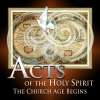
Thursday, February 23, 2012
by Robert Dean
Passage: Romans 5:3-5
Series: Romans (2010)
Duration: 59 mins 38 secs
Hope is the end product of a series of choices and the upward momentum of spiritual growth. Making these choices isn’t always easy. But growth is the result of choices. Maturity and consequent happiness is a choice. We must make grown-up decisions in a world of less than positive circumstances. The spiritual life isn't effortless. Growth and maturity are often the result of facing difficult decisions. This runs contrary to the self-absorbed focus of our narcissistic culture which has rejected adult values for the immediate gratification of adolescent fantasies built on utopian dreams. In contrast, biblical hope or confidence in our certain future provides strength for facing present trials. A tough mental attitude in facing trials isn’t developed through the exercise of “no pain, no gain” mantras, but is based on understanding reality as God defines it. We face life in light of God's promises with a focus on the One who made the promise. Giving up on God’s promise of hope and endurance in order to cave into pressure may result in repeated worldly perversion that declines to a point of no return, the loss of eternal, spiritual rewards and the loss of all the blessings God has made available now and in eternity. For the believer, Grace is never diminished and salvation never lost, but a measure of rewards in time and in eternity may be surrendered permanently. So how do we develop the mental attitude strength to face today's challenges in light of eternity's promise?

Thursday, March 01, 2012
by Robert Dean
Passage: Romans 5:3-5 & James 2:3-5
Series: Romans (2010)
Duration: 1 hr 0 mins 12 secs
This lesson also includes 2 Peter 1:3-11

Thursday, March 22, 2012
by Robert Dean
Passage: Romans 5:3-5 & 2 Peter 1:3-9
Series: Romans (2010)
Duration: 1 hr 2 mins 32 secs

Thursday, April 05, 2012
by Robert Dean
Passage: Romans 5:3-5 & 2 Peter 1:3-8
Series: Romans (2010)
Duration: 1 hr 4 mins 34 secs

Tuesday, November 20, 2012
by Robert Dean
Passage: Acts & Topical
Series: Acts (2010)
Duration: 1 hr 4 mins 22 secs
Disciple is not always a synonym for believer. It’s also used for a committed believer and other times it’s used for the original twelve apostles. There are early, non-scriptural manuscripts that give us an idea about the apostles’ lives and their martyrdom. Andrew, the first apostle Jesus called, was Peter’s brother. After Andrew heard from John the Baptist that Jesus was the Lamb of God, he told Peter they had found the Messiah. Andrew was the quieter of the two, usually mentioned as Peter’s brother. Learn about Andrew’s travels east and possibly north, his crucifixion on an “X”-shaped cross, the disposition of his remains and his connection to Scotland. Finally, discover evidence of Bartholomew’s identification with Nathaniel, his travels to India and his martyrdom.

Tuesday, March 19, 2013
by Robert Dean
Passage: Acts 14:1-7
Series: Acts (2010)
Duration: 1 hr 7 mins 13 secs
As the church expands, we see a trend toward the future disconnect of Christian Jews as a sect meeting in the synagogue. The move is from a Jewish framework to a Gentile framework. Great multitudes of Jews and Gentiles in Iconium responded to Paul’s message in their synagogue. The Jews who were not obedient to the message of God’s grace stirred up a serious division. Paul and Barnabas had to flee to Lystra and Derbe where they continued to preach the gospel. Study all that is understood in the word believe. Is the word here for unbelieving the opposite of believing? How is this word translated in other passages?

Thursday, September 26, 2013
by Robert Dean
Passage: Romans 10:1-4
Series: Romans (2010)
Duration: 1 hr 4 mins 36 secs
Are we puppets being manipulated to bring about God's plan for history or can we freely make our own choices? Listen to this lesson to learn that God is powerful enough to allow us free will but is nevertheless always bringing about His plans. Follow along to see that in spite of a pause because of the nation Israel's spurning of the Messiah, God's plan for them is still on track. Listen to a quick assessment of what has been covered so far in Romans and learn the difference between salvation and justification with the emphasis on righteousness.

Thursday, January 02, 2014
by Robert Dean
Passage: Romans 12:3-4
Series: Romans (2010)
Duration: 1 hr 1 mins 29 secs
Me! Me! Gimme a gift! Who doesn't love to get a gift? Listen to this lesson to learn about an extraordinary gift, a spiritual gift, graciously bestowed on each of us by God when we trust in Christ as our Savior. See that the purpose of this gift is not for bragging rights or to make us look good in the eyes of others but to be used to benefit other believers in our local church. Learn the different words used to describe these gifts and how these gifts are for Church Age believers only. Understand that through spiritual growth and the transformation of our thinking we come to exercise our spiritual gift fully in service to God.

Thursday, January 09, 2014
by Robert Dean
Passage: Romans 12:3-4
Series: Romans (2010)
Duration: 1 hr 0 mins 32 secs
What do you want to do when you grow up? This isn't just a question for children, but all believers are given a spiritual gift at the instance of salvation which is to be used to benefit other believers. Listen to this lesson to see how, as we mature spiritually, we gain the resources to use our spiritual gift. Find out how to evaluate a local church to attend or see if your only choice is to participate in electronic messages where you still have options for exercising your spiritual gift. Learn that Christ took a victory ascent to Heaven after His resurrection and distributed spiritual gifts. Ask ourselves if we are willing to go through the process God has designed for us so we are prepared to rule and reign with Christ.

Tuesday, February 18, 2014
by Robert Dean
Passage: 1 Thessalonians 1:3 & Romans 5:3-5
Series: 1 Thessalonians (2013)
Duration: 59 mins 18 secs
Are you still stuck in diapers in the spiritual nursery? Or are you zooming through spiritual childhood and reaching adulthood in your Christian life? Listen to this lesson to learn that the new believers in Thessalonica were grabbing hold of the Word of God and making great strides in their spiritual lives within an amazingly short time. Measure yourself on your mastery of three valuable virtues that Paul uses to show the stages of spiritual growth. Revisit the spiritual skills that should become second nature in your life when you reach maturity.